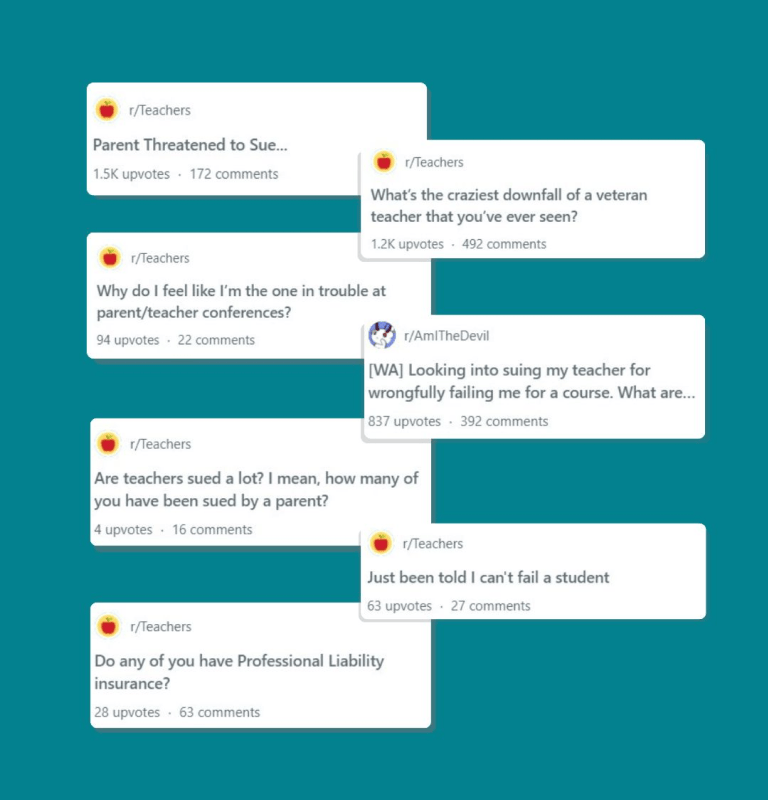Pop Quiz!
Can you answer these questions about liability insurance through your school, union, or association?
- If I’m sued, would an attorney provided by my school insurance advocate for me or the school?
- Is my school or union obligated to represent me or pay my legal fees?
- Could my district or union settle a lawsuit without my permission?
- What about if a suit is filed after I leave a job or stop paying dues — am I still covered?
- Can my school or district sue me if they get sued because of something I did?
- Will my insurance pay for all legal expenses and damages up front?
Teachers frequently count on their school, union, or association to cover classroom risks but still struggle to answer these serious questions. If that’s you, you’re not alone!
The sad truth is that school, district, and even union liability coverage can leave you standing alone when push comes to shove. If you’re foggy about how teacher liability insurance works or wondering if you need your own coverage, you’re in the right place.
As we walk through the biggest reasons why teachers need liability insurance, consider which of these vulnerabilities you see in your own classroom.
8 Compelling Reasons Teachers Need Insurance
Educational excellence, grading fair, and following the rules are a good start to avoid lawsuits — but they don’t guarantee your safety like they should. The following risks mean that even careful and compassionate teachers like you can pay out of pocket for legal trouble without insurance.

1. Lawsuits Against Teachers Are on the Rise
Many school districts are steadily increasing their spending to fight lawsuits. Take the example of 2024 legal spending in Maryland’s Montgomery County Public Schools, which jumped 548% in the last year alone.
While the problem is growing, it’s not new. The U.S. is one of the world’s most litigious countries. Americans file over 100 million lawsuits in state trial courts each year.
The most common lawsuits against teachers include:
- Assault
- Battery
- Defamation
- Intentional infliction of emotional distress
- Negligence
- Other issues: infringement of intellectual property or copyright, search and seizure, false imprisonment, failure to report, and more
Did you know that educators have been charged with battery for breaking up a fight or accused of negligence for not breaking up a fight? Teachers have to walk a fine line to balance their legal risks. When your financial and professional future can come down to a split-second decision, insurance is crucial.
What Does Teacher Insurance Do?
This is where teacher liability insurance comes in. Comprehensive insurance for teachers includes two main types of coverage: general liability and professional liability.
- General liability covers bodily harm or property damage to others that results from your teaching or duty of care
- Professional liability covers harm to others caused by what you do or fail to do as part of your teaching services.
That means insurance can pay for medical bills if a student is injured under your care, as well as representation costs, court fees, settlements, damages, and more if you get sued.

2. AI, Social Media, and Other Tech Risks Change the Game
Quantum leaps in video and audio technology plus large social media audiences equals complex, ever-evolving risks teachers and administrators often aren’t prepared to handle.
Manufactured deepfake videos and photos or recordings taken out of context are a teacher’s worst nightmare. Ferreting out faked evidence takes time – and the effects of a lawsuit or investigation can be devastating in the short term, even if you’re eventually cleared of wrongdoing.
Schools’ Deep Fake Problem
A disgruntled athletic director at Pikesville High School in Baltimore created AI deepfake audio of the principal making racist and antisemitic remarks. Before it was debunked, the audio file was shared 27,000 times, resulting in calls for the principal’s removal. The principal was put on administrative leave and will not return until the next school year, if at all.
Without laws to govern educators’ new technological risks, the charge of disrupting school activities may carry a state max sentence of just 6 months. Meanwhile, the damage to a reputation can be permanent.
Teachers’ Social Media Vulnerabilities
In 2024, Pennsylvania middle school students targeted over 20 faculty with fake TikTok accounts in teachers’ names. The accounts posted edited personal photos and made accusations of serious misconduct. While the scale of the problem helped identify these accounts as fake, a more targeted attack against one teacher is tougher to spot.
Fakes on social media aren’t a teacher’s only danger. Imagine you post a photo of a class activity everyone loved, but you didn’t spot that it catches a student in an unflattering pose. The post gathers cyberbullying comments before you notice and take it down. The bullied student’s parents sue you for invasion of privacy and negligence.
Cybercrime and Classroom Data Breaches
It’s tempting to assume that cyber criminals only go after big institutions like schools and corporations, but the reality is that more than 40% of small businesses were victims of a cyberattack last year. Small businesses usually can’t afford much protection, making them easier targets.
Teachers who run tutoring businesses or freelance online may collect student personal data and payment info. Collecting personal data makes protecting it your legal responsibility, and data breach lawsuits can get expensive if you’re paying out of pocket without insurance.
What Does Teacher Insurance Do?
Cyber liability insurance is a common add-on for teacher and tutor liability insurance designed as a safety net to keep lawsuits and the cost of recovering stolen info from draining your finances.
Professional liability insurance may also cover costs from lawsuits due to social media mistakes or complaints against your teaching that come from fake posts.

3. Even Great Teachers Make Mistakes
You’ve worked hard to become an expert in your field — not to mention finding creative ways to make the lightbulb go on for students. But teaching errors or failure to adequately research risk can cause students or parents to question your professional ability.
In the 2021 case of Yanes v. the City of New York, a teacher was sued by the family of a student burned during a science experiment. The teacher hadn’t realized the U.S. Chemical Safety Board flagged the experiment as dangerous after a similar accident in another school. The court awarded the family $29 million.
Accidents don’t even have to be that dramatic. In a recent teacher negligence case, a substitute was sued along with the board of education when, distracted by one student, she failed to prevent bullying and harm to another. The student was awarded a settlement in 2023 after expensive court battles dragged on over four years.
What Does Teacher Insurance Do?
The professional liability protections in a good teacher insurance policy are also known as “errors and omissions” or E&O coverage. It’s specifically designed to protect you from the financial and legal fallout of things you did (errors) or failed to do (omissions) during your professional work.
4. False Allegations Are All Too Common
It often doesn’t click with students that false accusations can derail a teacher’s career — even something as simple as inventing preferential comments to excuse a bad grade.
Schools rightly try to believe students, but teachers often don’t have protections when the allegation is fake. An investigation can be long and public, costing teachers their reputations (and personal finances) no matter the outcome. Other teachers face job consequences or charges before a substantial investigation takes place.
In 2021, a former Teacher of the Year was arrested and charged after an accusation of physical abuse. Charges were dropped following a year of investigation and legal wrangling, but not before the school had already publicly distanced itself from the teacher.
What Does Teacher Insurance Do?
Paying to defend yourself is the last thing you want to think about at a time like this. Adding sexual abuse and molestation (SAM) coverage to your teacher insurance can help with court costs after a false misconduct allegation. Even if you never use it, this coverage provides financial peace of mind for the what-ifs teachers worry about.

5. You Can Be Sued Even for Fair Teaching
Simply being good at what you do, respectful of others, and fair to students isn’t always enough to avoid a lawsuit. Parents may blame teachers’ instruction for a student’s underwhelming test scores or even sue teachers for failing grades, citing the impact on a student’s future.
What Does Teacher Insurance Do?
When an educator could be sued no matter what they do, teachers need liability insurance to shield them not just from error, but from paying for good teaching judgment.
Unsuccessful lawsuits around grading are common, but you may still have to pay for a lawyer and legal fees surrounding the case even if the suit goes nowhere. Professional liability insurance for teachers is purpose-built protection from legal costs that can strain your wallet.
6. Liability Waivers & Permission Slips May Not Eliminate Risk
Many teachers lean on permission slips and liability waivers, hoping that written, signed consent will protect them in riskier situations like field trips, special projects, and extracurriculars.
In the case of Munn vs. Hotchkiss School, which also named the teacher, parents sued when their child contracted a tick-borne illness on a class trip. The fact that parents signed a permission slip and a waiver didn’t matter. The court found that the waiver didn’t do enough to warn of the danger of insect-borne diseases, and a jury verdict awarded the family $41.5 million.
What Does Teacher Insurance Do?
Liability waivers are an extra layer of protection, but they aren’t teacher insurance or a guarantee that you won’t be liable anyway. Liability insurance is your primary defense since it’s designed to protect you financially when waivers fail.

7. Your School or District Policy May Not Cover You
Most teachers depend on their school’s or school district’s insurance policy to be their first (or only) line of defense. Even if you have some coverage through your district, there are two big reasons why school insurance often isn’t enough:
- School districts typically don’t name individual teachers on their policy, so they don’t always cover you. Employees automatically included under an insurance policy are typically covered only if they face a claim while acting within the scope of their duties. That leaves a lot of room for interpretation and loopholes when it matters most.
- Class action lawsuits can drain a district’s policy dry, leaving nothing left for individual teachers. When your district’s legal fees go over the amount of coverage they paid for, they pay their own costs first and leave teachers to fend for themselves.
Take the time to research the best location for you as a teacher, as each state and district has its own policies and benefits. Remember that the school’s or district’s policy is designed to protect them, not necessarily you.
What Does Teacher Insurance Do?
Your own teacher liability insurance policy in your name is designed to protect you first and foremost. Plus, you don’t have to share your limits with the district, school, or other teachers.
8. You May Have Better Options Than a Union or Association
The other big drive behind the question “do teachers need insurance?” is that many teachers have liability coverage through their union or educator association. While a lot of benefits come along with your monthly or yearly dues, a union or association may not be the best option to protect you when a lawsuit happens.
Consider these factors:
- Control: Educators often don’t realize how much power their insuring union or association has over their defense. Under the duty of fair representation, unions have leeway in whether they want to handle your case or continue if they think it’s unwinnable or too expensive. They don’t have to pursue investigations or negotiations how you prefer, and they can settle a false claim even if you want to fight it. Union teachers sometimes hire their own lawyers and swallow the expense anyway to have more say.
- Named vs. Unnamed: If you’re not listed by name on the union’s or association’s policy, you’re looking at a potential repeat of the issues with your school or district policy.
- Cost: Union dues in particular can be pretty steep. Anecdotal dues reporting ranges from $300 to $1200+ annually depending on location and membership in local, state, and national unions. Unions (usually) also provide collective bargaining and professional development, but if the main reason you pay dues is legal representation, you can get robust teacher insurance at Insurance Canopy for as low as $229/year.
- Coverage type: Make sure your insurance covers both general and professional liability. Both are necessary to cover you for all your biggest risks.
- Coverage customization: Want to insure your school supplies and equipment, or protect against data theft costs? Union and association policies are typically one-size-fits-all and don’t allow you to personalize coverages.
Teachers Liability Insurance Designed for You
If you’re nervous about handling risky situations in the classroom, you’re not alone.

Educator’s risks have never been greater, but knowing your insurance is designed to cover you offers the peace of mind to teach boldly. Explore the benefits of carrying your own policy with teacher liability insurance.

Teaching Insurance FAQs
Why Should Teachers Have Liability Insurance?
Teachers need liability insurance to cover the thousands of risks they face daily. It’s also important because they may only have limited or conditional coverage through the liability policy carried by the school where they work.
Whether it’s worrying about student injuries in K–12, suing over bad grades in universities, or data theft lawsuits for online teaching, educators deal with liability no matter where they teach. Working with admin, colleagues, and parents also creates many risks for teachers.
What Does Educators Liability Cover?
Educator liability insurance from Insurance Canopy offers these essential coverages:
- General and professional liability
- Products and completed operations
- Personal and advertising injury
- Damage to premises rented to you
- Medical expense
- Unlimited additional insureds
What Is an Umbrella Policy for Teachers?
A teachers umbrella policy is an endorsement (or add-on) to an existing insurance policy like a homeowners policy. Some teachers use an umbrella policy to get cheap teacher liability coverage, but there are a few key shortcomings to this route that many educators don’t know:
- Most umbrella policies will not cover your teaching risks since they do not cover professional and business liability unless you add a special endorsement.
- Umbrella policies that cover teachers typically only cover K–12 teachers employed by a school. University and college teachers, substitutes, independent tutors, and other self-employed teachers are not covered.
- Umbrella policies are meant to be extra coverage, not your main line of defense. With an umbrella policy, you miss out on the additional protections offered in comprehensive liability insurance tailored to teachers.





